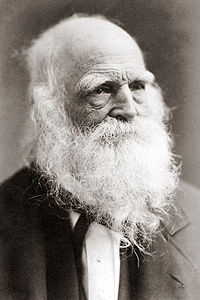Analysis of The Death of Slavery
William Cullen Bryant 1794 (Cummington) – 1878 (New York City)
O THOU great Wrong, that, through the slow-paced years,
Didst hold thy millions fettered, and didst wield
The scourge that drove the laborer to the field,
And turn a stony gaze on human tears,
Thy cruel reign is o’er;
Thy bondmen crouch no more
In terror at the menace of thine eye;
For He who marks the bounds of guilty power,
Long-suffering, hath heard the captive’s cry,
And touched his shackles at the appointed hour,
And lo! they fall, and he whose limbs they galled
Stands in his native manhood, disenthralled.
A shout of joy from the redeemed is sent;
Ten thousand hamlets swell the hymn of thanks;
Our rivers roll exulting, and their banks
Send up hosannas to the firmament!
Fields where the bondman’s toil
No more shall trench the soil,
Seem now to bask in a serener day;
The meadow-birds sing sweeter, and the airs
Of heaven with more caressing softness play,
Welcoming man to liberty like theirs.
A glory clothes the land from sea to sea,
For the great land and all its coasts are free.
Within that land wert thou enthroned of late,
And they by whom the nation’s laws were made,
And they who filled its judgment-seats, obeyed
Thy mandate, rigid as the will of Fate.
Fierce men at thy right hand,
With gesture of command,
Gave forth the word that none might dare gainsay;
And grave and reverend ones, who loved thee not,
Shrank from thy presence, and in blank dismay
Choked down, unuttered, the rebellious thought;
While meaner cowards, mingling with thy train,
Proved, from the book of God, thy right to reign.
Great as thou wert, and feared from shore to shore,
The wrath of Heaven o’ertook thee in thy pride;
Thou sitt’st a ghastly shadow; by thy side
Thy once strong arms hang nerveless evermore.
And they who quailed but now
Before thy lowering brow,
Devote thy memory to scorn and shame,
And scoff at the pale, powerless thing thou art.
And they who ruled in thine imperial name,
Subdued, and standing sullenly apart,
Scowl at the hands that overthrew thy reign,
And shattered at a blow the prisoner’s chain.
Well was thy doom deserved; thou didst not spare
Life’s tenderest ties, but cruelly didst part
Husband and wife, and from the mother’s heart
Didst wrest her children, deaf to shriek and prayer;
Thy inner lair became
The haunt of guilty shame;
Thy lash dropped blood; the murderer, at thy side,
Showed his red hands, nor feared the vengeance due.
Thou didst sow earth with crimes, and, far and wide,
A harvest of uncounted miseries grew,
Until the measure of thy sins at last
Was full, and then the avenging bolt was cast!
Go now, accursed of God, and take thy place
With hateful memories of the elder time,
With many a wasting plague, and nameless crime,
And bloody war that thinned the human race;
With the Black Death, whose way
Through wailing cities lay,
Worship of Moloch, tyrannies that built
The Pyramids, and cruel creeds that taught
To avenge a fancied guilt by deeper guilt—
Death at the stake to those that held them not.
Lo! the foul phantoms, silent in the gloom
Of the flown ages, part to yield thee room.
I see the better years that hasten by
Carry thee back into that shadowy past,
Where, in the dusty spaces, void and vast,
The graves of those whom thou hast murdered lie.
The slave-pen, through whose door
Thy victims pass no more,
Is there, and there shall the grim block remain
At which the slave was sold; while at thy feet
Scourges and engines of restraint and pain
Moulder and rust by thine eternal seat.
There, mid the symbols that proclaim thy crimes,
Dwell thou, a warning to the coming times.
| Scheme | XAABCCDCCCAA XEEAFFGBGBXC HIIHJJGKGLMM CNNCXCOPOPMM CPPCOONXNCQQ RSSRGGTLTKUU DQQDCCMVMVWW |
|---|---|
| Poetic Form | |
| Metre | 1111110111 1111010011 01110100101 0101011101 110111 11111 0101010111 11110111010 1100110101 011101001010 0111011111 1011011 0111100111 1101010111 10101010011 111101 11011 111101 11110011 011110001 11011010101 1001110011 0101011111 1011011111 011111111 0111010101 0111110101 111010111 111111 110101 110111111 01010011111 1111000101 11100101 11010100111 1101111111 1111011111 0111011011 110101111 11111110 011111 0111001 0111001101 01101100111 01110101001 01010101 110110111 01010101001 1111011111 11111011 1001010101 1101011101 110101 011101 11110100111 1111110101 1111110101 0101101001 0101011111 11010010111 111110111 11010010101 11001010101 0101110101 101111 110101 101110011 0100010111 10101011101 1101111111 1011010001 1011011111 1101011101 10110111001 1001010101 0111111101 011111 110111 1101101101 1101111111 1001010101 1001110101 1101010111 1101010101 |
| Closest metre | Iambic pentameter |
| Characters | 3,505 |
| Words | 635 |
| Sentences | 19 |
| Stanzas | 7 |
| Stanza Lengths | 12, 12, 12, 12, 12, 12, 12 |
| Lines Amount | 84 |
| Letters per line (avg) | 33 |
| Words per line (avg) | 8 |
| Letters per stanza (avg) | 399 |
| Words per stanza (avg) | 90 |
Font size:
Submitted on May 13, 2011
Modified on March 22, 2023
- 3:10 min read
- 87 Views
Citation
Use the citation below to add this poem analysis to your bibliography:
Style:MLAChicagoAPA
"The Death of Slavery" Poetry.com. STANDS4 LLC, 2024. Web. 12 Jun 2024. <https://www.poetry.com/poem-analysis/40343/the-death-of-slavery>.


Discuss this William Cullen Bryant poem analysis with the community:
Report Comment
We're doing our best to make sure our content is useful, accurate and safe.
If by any chance you spot an inappropriate comment while navigating through our website please use this form to let us know, and we'll take care of it shortly.
Attachment
You need to be logged in to favorite.
Log In